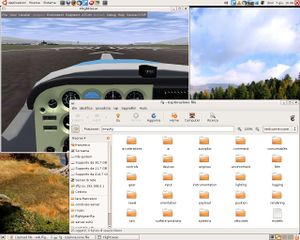FgFuse: Difference between revisions
Jump to navigation
Jump to search
Legoboyvdlp (talk | contribs) No edit summary |
m (Bolding the article title in first section; Copyediting; Some rephrasing) |
||
| Line 1: | Line 1: | ||
[[File:Fgfuse.jpg|thumb|300px|A screenshot of a running FlightGear and nautilus browsing the prop radix]] | [[File:Fgfuse.jpg|thumb|300px|A screenshot of a running FlightGear and nautilus browsing the prop radix]] | ||
FgFuse is a fuse | '''FgFuse''' is a fuse file system for Linux that lets you browse, read and write the properties of FlightGear from a mount point. | ||
Communication between FgFuse and [[FlightGear]] is done via a socket connection. | Communication between FgFuse and [[FlightGear]] is done via a socket connection. | ||
{{note|FgFuse is written in Python and needs the '''python-fuse''' package installed.}} | |||
= Download = | == Download == | ||
You can download the script from [http://brisa.homelinux.net/fgfs/fgFuse.py here] | You can download the script from [http://brisa.homelinux.net/fgfs/fgFuse.py here] | ||
= Usage = | == Usage == | ||
First of all you need to launch FlightGear with the --telnet option | First of all you need to launch FlightGear with the <code>--telnet</code> option: | ||
fgfs --telnet=10000 | fgfs --telnet=10000 | ||
</ | |||
where <code>10000</code> is the telnet port to listen to. After launching FlightGear, launch FgFuse for example like this: | |||
python fgFuse.py 127.0.0.1 10000 /tmp/fg/ | python fgFuse.py 127.0.0.1 10000 /tmp/fg/ | ||
where | where | ||
* 127.0.0.1 is the address of the | * <code>127.0.0.1</code> is the address of the PC running FlightGear | ||
* 10000 is the | * <code>10000</code> is the telnet port which FlightGear session is listening to | ||
* /tmp/fg/ is the empty directory that will be mounted | * <code>/tmp/fg/</code> is the empty directory that will be mounted | ||
When finished unmount the folder with this command: | |||
fusermount -u /tmp/fg/ | |||
fusermount -u /tmp/fg/ | |||
= | == Troubleshooting == | ||
* The script needs to connect to FlightGear via telnet | * The script needs to connect to FlightGear via telnet. If you launch the script too soon, it could be possible that FlightGear has not opened the socket yet. | ||
* The script is at | * The script is at an early development stage, so expect errors to occur. | ||
[[Category:Software]] | [[Category:Software]] | ||
Latest revision as of 11:38, 14 July 2015
FgFuse is a fuse file system for Linux that lets you browse, read and write the properties of FlightGear from a mount point.
Communication between FgFuse and FlightGear is done via a socket connection.
| Note FgFuse is written in Python and needs the python-fuse package installed. |
Download
You can download the script from here
Usage
First of all you need to launch FlightGear with the --telnet option:
fgfs --telnet=10000
where 10000 is the telnet port to listen to. After launching FlightGear, launch FgFuse for example like this:
python fgFuse.py 127.0.0.1 10000 /tmp/fg/
where
127.0.0.1is the address of the PC running FlightGear10000is the telnet port which FlightGear session is listening to/tmp/fg/is the empty directory that will be mounted
When finished unmount the folder with this command:
fusermount -u /tmp/fg/
Troubleshooting
- The script needs to connect to FlightGear via telnet. If you launch the script too soon, it could be possible that FlightGear has not opened the socket yet.
- The script is at an early development stage, so expect errors to occur.
